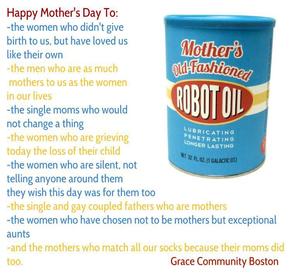discipleship
in chaos
Learn more about who we are by following our blog, written by our pastor, preacher, and chief evangelist. Engage in the everyday sacred as Abby writes about the deep and ordinary all at once.
"Grace is not a commodity. No one can corner the market."  I’m the pastor of a community named Grace. Clearly I’m partial to the word. Anne Lamott describes grace as “the light or electricity or juice or breeze that takes you from that isolated place and puts you with others who are as startled and embarrassed and eventually grateful as you are to be there.” Grace is no-strings-attached love. It is an active force that infuses our lives with the boundless pulse of the Spirit. Yet still these descriptions cannot possibly capture the moments in my life so steeped in grace I was sure I had come face to face with God. I cannot tell you what Grace is. I can, however, confidently tell you what Grace is not. Grace is not self-serving or impatient. It cannot be boxed in or controlled. Grace is not stingy. I know firsthand the difference between stingy and abundant. I grew up with two sets of grandparents. One set of grandparents rarely met us at the door when we visited. They almost never showed up at any of our events. There were only half rotten bananas to eat on their kitchen table so I stole sugar cubes from the fancy sugar bowl collecting dust in their dining room. Although later in life I would discover they were quite generous philanthropists, I never would have described my grandparents as generous. They loved me, I suppose, out of duty, but they were quite stingy with their love. When we visited our other grandparents, my grandmother would fling open the door with a cackle of delight only she could conjure. After hugs and kisses we found our way to her kitchen stocked with every one of her seven grandchildren’s favorite foods. We would then march into the back room where my grandfather sat enthroned in his chair. Kisses and hugs and laughter ensued. Our time with them was filled with museums, games, late night movies (don’t tell your mother), lessons in you name it, fresh squeezed orange juice and even cash. Yes, they gave us money for the latest thing we wanted. They delighted in our presence. My grandmother in particular never missed a moment. She came to every game, every performance, every graduation. They loved us simply because we were born into their lives. We didn’t earn their love. It was already there, waiting for us, when we entered the world. It was Grace. I know the difference between stingy and abundant. Only later in my adolescence did I realize my stingy grandparents were quite wealthy and my abundant grandparents were absolutely middle class. I was sure that the grandparents who had nothing to eat but rotten bananas were horribly poor and that my grandparents who bought cases of the latest thing we were selling were RICH! They handed out $10 bills like candy! *** Grace is not a commodity. No one can corner the market. It’s renewable and free. My beloved grandparents understood that. So did the father of the prodigal son (Luke 15). When his wayward profligate son returns home, the father flings open the door (perhaps with the same delightful cackle as my grandmother) and runs out to meet his child. He embraces his son, giving thanks that he is alive. Then he throws a party. The older brother of the prodigal son seems to think Grace is a finite commodity. He unleashes his jealousy and righteous anger upon his father, asking the father why the irresponsible son gets the party but not the hardworking son. The brother thinks there is only so much Grace to be shared in the world; he doesn’t understand that there is Grace for all, Grace for his reckless brother, and more than enough Grace waiting for him. Grace is never stingy. Ever. It does not judge. It is not jealous. We cannot define it, but the parable of the Prodigal Son is perhaps the best description we have. Grace runs to embrace us, just like the front door of my grandparents’ house would fling open with cackles of delight. Grace packs the refrigerator with all of your favorite food. Grace always welcomes us home, and Grace welcomes everyone home—wasteful children, cold grandparents, and resentful, responsible elder brothers. Grace is abundant. Grandma Ednut Just for kicks, this is my grandmother long before she had four children and seven grandchildren. She was an exceptionally elegant woman with long legs. But she also cackled! She showed all of her teeth and her face folded with wrinkles when she laughed. It was as if her elegance was an after thought and her cackle was who she truly was. My favorite memory of her laughter is when as a little girl, no older than three, I was sitting on her lap and let a fart rip! I knew enough that farting was impolite, but was sure its silent nature had me protected. My grandmother started laughing and tickling me, asking me over and over again, "You would fart on your grandmother?!" Perhaps the music of Grace is a joyful laugh? I know for sure that cackle awaits me.
5 Comments
Our modern day widows are the low-income households who always invite others to their dinner table.  As a mother of three and a domestic chief operating officer, I spend a great deal of my week dealing with food. Here’s the amazing thing: I’m not a farmer’s wife in 1940. I preserve next to nothing, my milk is delivered to my door, and I have no idea how to pluck a chicken. Still, I spend an estimated 18 hours a week packing lunches, preparing breakfast and dinner, planning meals, writing grocery lists, and loading and unloading the dishwasher. I am forever looking for healthy, well-balanced meals according to the latest and greatest information out there. I feel defeated when I sit down to a sleeve of Ritz crackers (but they are soooooo good). As a result there is very little pre-packaged instant food in my house. But please, don’t have too high an opinion of me; we eat a lot, and I mean a lot, of ice cream and there are always sticks of butter in my fridge. We don’t eat prepackaged food but we eat butter-laden cookies. And there are times I check out, give up, and buy pizza or tell my children to eat cereal for dinner, especially on Sunday nights. With so much food experience, I thought I was up for the challenge my faith community set out: reduce our monthly grocery spending by half and give the other half to organizations that feed the hungry. I thought I could at least offer a $200 check at the end of the month. I failed. Miserably. Here’s how it started. Since January, our faith community has been wrestling with the simple concept, Have 2 Give 1. We are acutely aware of how much we have. For environmental, material, and above all spiritual reasons we have tried to defeat our consumption addiction. We began small. In January we cleaned out our closets, February our books, March our housewares, and April we decided it was time to think about food. Until April, I was proud of our accomplishments. I honestly got rid of at least a 1/3 of my already fairly small closet. We sorted clothes and gave them to families and places who really could use them. (Did I mention I also picked out three sweaters and one shirt for myself in our clothes sorting party?) Books filled homeless shelters and schools. Housewares were delivered to an amazing local organizations, NewLife Home Refurnishing. We were on a role. I thought that cleaning out our food pantries would be simple—we would give away half of what we had to the local food pantry. But a faithful disciple suggested something more radical. What if we reduced our spending by half, and gave the other half of our monthly grocery bill away. I was in. I could do it. I’m a grocery-shopping and cheap food-cooking expert. It’s my part time job as domestic COO. I spend about $900 a month on groceries. Yes, $900 a month. You should see what my two boys eat! My goal was to spend only $500 and attempt to give $400 away. I figured I wouldn’t quite reach my goal, but the goal was worthy and I would have at least $200 or possibly more to give at the end of the experiment. The entire month, I kept careful track of my expenditures, wouldn’t let my husband go to the grocery store without specific warnings and threats (you cannot buy frozen pies!), took stock of my pantry, used a lot of beans and lentils, and bought as much as possible on sale. Yet there were a few things I decided I would be unwilling to do without. I would not radically cut down on fresh fruit and veggies, I would continue to buy organic celery, apples, and a few other things that make it on the dirty dozen pesticide list, and I would not buy a bunch of processed-empty-calorie-cheap food. What an arrogant fool I am! I thought I was so smart. I knew how to cook. I knew how to buy things on sale. I knew how to make really good food (my children don’t agree) out of lentils! I could cut back our grocery bill drastically for one month. Not to mention, I was stocked up. I had lots of good basics on my shelves. Epic fail! I have less than $50 to show for my arrogance. I knew before I answered our one month community wide endeavor that eating well costs more, but I didn’t understand it viscerally. Now I do. Here, sadly, is what I learned: 1) Eating fresh fruits and vegetables is terribly expensive, especially organic celery (one of the dirty dozen). There are some pretty good cheap frozen veggies out there, but what do you send your kid to school with? Frozen peas? 2) Buying a processed frozen meal is often cheaper than making one from scratch. Can you believe it? I couldn’t. But I was reminded of this again and again as I trolled the frozen food section looking for veggies. It was less expensive to buy my family frozen tater–tots and fish sticks than to make rice and beans with hearty root vegetables from scratch. Empty calorie food isn’t just cheaper, it’s significantly cheaper than whole foods. Even cookies! I could buy packaged cookies for $1.50 on sale; I can’t bake cookies for that little. 3) Healthy food rarely goes on sale. Ketchup goes on sale (which is a great thing in my house), but rarely fresh fruits and veggies. Gross, slimy lettuce does. And yes, apples can be reduced by 10 cents, but it’s not enough to make budget. 4) You need money upfront to save. If you have the money to stock your pantry you can save significantly. For example, my daughter lives on one particular cereal. When it goes on sale, I buy at least 8 boxes. This can save me up to $10, but if you are on a strict monthly budget you cannot buy 8 boxes of cereal. I stopped shopping at Costco during our month long Have 2 Give 1 grocery experiment. The bulk cost of Costco didn’t fit into my budget even though I knew it would save me money in the long run. In fact, I think I might have lost money this month on the savings I passed by. 5) Saying no to kids in regards to food is painful. I say no to my kids all the time. Ask them. Mom, can I have a new lacrosse stick? NO! Can I please, please, please have a pack of gum? NO! But I want the new My Little Pony! NO! . . . . But food? You might as well have slayed me when my 11 year old asked if I could buy him sourdough bread for his school sandwiches. I had to explain that it’s much more costly than regular bread. Or when my daughter saw the bright colored fruit and inquired if we could get some. No, I explained, the oranges are much cheaper. But I’m sick of oranges, she responded. I was sick of oranges too. 6) Hospitality isn’t possible on a tight budget. I come from a long line of feeders. I dream of being the mother every teenager visits just so I can load them up with plates of food and buttery cookies. Our grocery experiment coincided with April vacation. I wondered if I should tell the kids who were spending time at my house to pack lunch. I wondered what it is like for parents on a tight budget when their kid’s friends come over for a visit. Do they secretly cringe, their anxiety rising, when the football player boyfriend walks into their home at dinner time? I became deeply aware that although my hospitality is authentic, it costs me nothing. I understood more clearly Jesus’ story of the widow’s mite (Luke 21), the widow who gave so generously out of her poverty, to the shame of those who gave so stingily out of their wealth. Our modern day widows are the low-income households who always invite others to their dinner table. Nothing I learned this past month is anything new. Sociologists, political activists, and food pantry volunteers have been speaking out about the limited food resources of low income families for decades. I was sympathetic, but know I viscerally understand. I have learned that grocery budgets have nothing to do with smarts, nothing to do with organization, nothing to do with coupons. You cannot purchase or prepare healthy, wholesome food on a tight budget. Being poor sucks. And it’s unhealthy. I hate Mother’s Day. I think Mother’s Day (and Father’s Day too) is the most fabricated, exclusionary, and covertly misogynistic holiday on the books. I have every reason to enjoy this coming Mother’s Day. I am married to a dear man who I am positive will make sure I am showered with attention. My three children are healthy and still young enough to offer me hand-picked weedy bouquets and construction paper cards. And for the first time in perhaps 15 years my own mother will be with me. My mother, imperfect as all mothers, did a great job at meeting my emotional needs as I grew up under her loving protection. I am deeply grateful for her presence and steady love in my life. But still I hate Mother’s Day. As a feminist, as a pastor, as a woman who spent the early years of her marriage pining away for children, and as an LGBTQ advocate (just to name a few) Mother’s Day offends me to my very core. Here are my reasons why: #1 Mother’s Day is often artificially fabricated and often stilted! · This is the least of my reasons, but shouldn’t we be thankful for the individuals who love us into being every day? Do we really need a special day to prompt us? · I’ve observed something odd about Mother’s Day: gift-giving is getting out of control, whether it’s a fancy brunch or a brilliant bouquet or expensive jewels. These materialistic rituals appear to be making up for growing unhappiness and dissatisfaction. · Some children have terrible mothers. Really. Terrible mothers who should not receive a card on Mother’s Day. Still, our society pressures their daughters to send something with comments like, “No matter what, she’ll always be your mother.” These children should be celebrated for surviving their childhoods, not forced to recognize their mother on a fabricated holiday. · Some children are painfully difficult to mother. I know a mother who made the brave decision to utterly cut ties with her daughter. She understood that to save herself and save her other children she has to disown her own child. You can lay whatever judgement you want on this woman, but have you reared a sociopath? Mother’s Day leaves this woman overwhelmed with such grief that she often slips back into a depression for weeks.  #2 Mother’s Day is exclusionary! · I am 100% positive the church tradition of handing out flowers to mothers on Mother’s Day Sunday is well meaning, but it is downright dreadful. It has caused more unintentional pain than can be imagined. I know so many women who intentionally avoid church on Mother’s Day for this reason. Imagine all the women who desperately want children but were unable to conceive, or miscarried, or buried stillborns, or yearned for a life partner with whom to rear their child, or have given up their child for adoption. How do they feel on Mother’s Day, especially as they walk into a place that is supposed to be compassionate, like church? · Just because you did not give birth to a child doesn’t mean you aren’t a mother. I know two women in particular, childless themselves, who are the most exceptional mothers I’ve ever met to their nephews and nieces and godchildren. #3 Mother’s Day perpetuates old fashioned, misogynistic, heteronormative views! · Women should have choice around issues of procreation, marriage and rearing children. Mother’s Day upholds the old fashioned single path for women: get married (preferably before you are 25 and have young eggs), have children, stay home, volunteer at your children’s schools, pack their lunches, and ignore your own desires. If that is your calling, then that will be a blessed calling. But it’s not every woman’s calling. · Not all women feel called to motherhood and that really is okay. When asked as a child what I wanted to be when I grew up I responded a “mommy.” I meant it. I love being a mother. I also love the color blue and hate high heels. Does this mean I am less or more of a woman? I also do not enjoy being a full time mother but much prefer part time or full time work. Do I love my children less as a result? No, I love them all the more. · You do not need a vagina to be a mother. Really. There are men I know who have “mothered” their children with more affection, attention, and constancy than their biological mothers. · If you haven’t noticed, families are elastic these days in surprisingly beautiful ways. Some children have two moms, no moms, a step mom, birth mom, sister-mom, you name it. Some individuals may have egg donors, but they do not have mothers. Can we please give up the ghost!? Can we please quit this fabricated, exclusionary, misogynistic, heteronormative old school holiday? If you desperately want some special day can we combine Mother’s Day and Father’s Day to create Person-Who-I-Am-Particularly-Thankful-For-Day? (Clearly we would have to work on the name.) I am well aware that my one woman campaign will be ineffective, but in closing I offer one suggestion. This Mother’s Day send a card or deliver some flowers to someone other than your mother or spouse. Take them to your babysitter and thank them for loving your children. Send a card to your best friend’s Dad who drove you to every soccer practice. Take out your single mom neighbor. Please for the sake of everyone who provides love and affection, celebrate them all, and not just the ones who fit into our designated Ozzie and Harriet gender roles. Everybody who loves should be celebrated. Let’s blow this holiday wide open! See my posts in May 2013 (make sure to scroll down) and May 2014 to read a more nuanced discussion of Mother’s Day . |
Abby HenrichRev. Abigail A Henrich (ehm!) is an ordained minister who earned her stripes at Princeton Theological Seminary and Colgate University. That said, Abby is really a mother-pastor-spouse who lives in a kinetic state of chaos as she moves from her many vocations: folding laundry, preaching, returning phone calls, sorting lunch boxes, answering e-mails, and occasionally thinking deep thoughts in the shower. Unabashedly she is a progressive Christian who believes some shaking up has got to happen in the church. Categories
All
Archives
March 2024
|